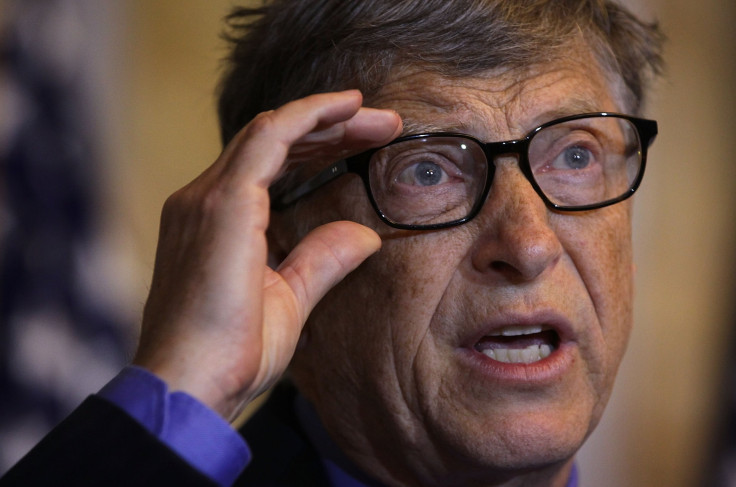Bill Gates Says New Laws Needed To Address Privacy, Security In Apple vs. FBI Dispute

UPDATE: 11:10 p.m. ET — Bill Gates, speaking on Bloomberg Go Tuesday morning, said that he was “disappointed” by a Financial Times story that said he's backing the FBI in its dispute with Apple, and that the story “doesn’t state my views.”
Instead, Gates supported the idea of a measured response that struck a balance between government and privacy. “I do believe that there are sets of safeguards where the government shouldn’t have to be completely blind,” he said.
Gates said there are plenty of cases of the government overstepping the mark, citing the J. Edgar Hoover-era FBI as an example, but that it was about striking the right balance between excessive government intervention and zero intervention when abuse is revealed. Ultimately, Gates said, the balance issue will be decided in Congress.
Original story:
Bill Gates has emerged as the most high-profile member of the Silicon Valley elite to voice criticism of Apple’s opposition to an FBI request to unlock the iPhone used by one of the San Bernardino, California, shooters.
Speaking at the publication of the annual letter from the Bill and Melinda Gates Foundation, Gates said he believes technology companies should cooperate with law enforcement agencies. The Microsoft founder also took issue with Apple CEO Tim Cook’s claim that the FBI request represents the creation of a backdoor that could have wider implications for Apple and the entire technology industry.
“This is a specific case where the government is asking for access to information,” Gates told the Financial Times. “They are not asking for some general thing; they are asking for a particular case.”
However, a report from the Wall Street Journal published Monday night suggests Gates is wrong. Quoting anonymous sources with knowledge of the matter, the report says the Department of Justice is pursuing court orders in “about a dozen cases” across the country to force Apple to unlock iPhones, in disputes similar to the one in the San Bernardino case.
Gates compared the request to the FBI asking for bank records. “Let’s say the bank had tied a ribbon round the disk drive and said, ‘Don’t make me cut this ribbon because you’ll make me cut it many times.’”
Gates’ comments stand in stark contrast to most of Silicon Valley, which has almost universally backed Apple and CEO Cook. On Monday at Mobile World Congress in Barcelona, Spain, Facebook CEO Mark Zuckerberg reiterated his and Facebook’s stance on the issue: “We are sympathetic with Apple. We believe in encryption. We believe that is an important tool.”

Google CEO Sundar Pichai and Twitter’s Jack Dorsey are other high-profile executives to publicly back Apple, while NSA whistleblower Edward Snowden has called it “the most important tech case in a decade.”
Research published Monday by the Pew Research Center finds that 51 percent of American adults believe Apple should cooperate with the FBI and unlock the phone; 38 percent say Apple should not unlock it; and 11 percent offered no opinion on the question.
While Microsoft and CEO Satya Nadella have not expressed strong support for Apple, the company has shown its support through the Reform Government Surveillance group, which issued a statement on behalf of a group of U.S. technology firms, including Microsoft.
Microsoft itself is embroiled in a court battle with the DOJ, which is seeking to gain access to emails held on servers in Ireland in relation to a drug case, calling it a case of “national sovereignty.” Microsoft claims the DOJ has exceeded its jurisdiction with companies like Apple as well as the government of Ireland filing amicus briefs on the matter, claiming it would set a dangerous precedent for governments around the world to access information stored in the cloud.
The battle between Apple and the FBI exploded last week when a judge ordered Apple to comply with an FBI request to “unlock” the iPhone used by Syed Rizwan Farook, one of the shooters in the Dec. 2 San Bernardino terrorist attack. In the days since the issue exploded, both sides have dug in.
In a blog post on Sunday night FBI Director James Comey argued that the bureau’s request is “quite narrow” and that he doesn’t want to “break anyone’s encryption.” On Monday, in a letter to employees of Apple, CEO Tim Cook acknowledged that while the company has no sympathy for terrorists, it doesn’t want to set a “dangerous precedent that threatens everyone’s civil liberties” by creating a backdoor into the smartphone.
© Copyright IBTimes 2025. All rights reserved.




















